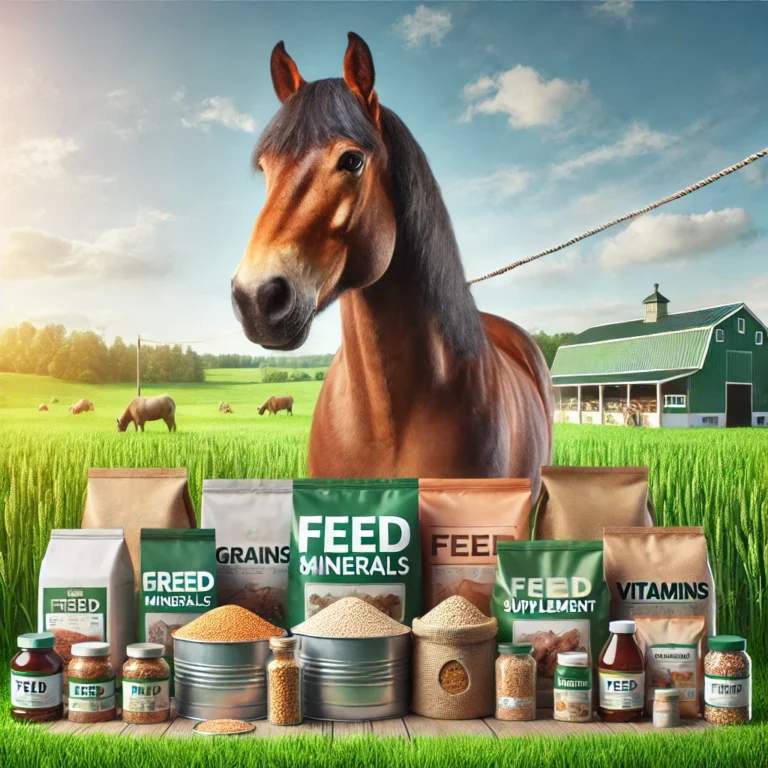Large animals, such as horses and cattle, are not just companions or livestock—they’re an integral part of many farms and homes across the USA. Ensuring their health and well-being starts with proper nutrition. Feeding them high-quality feed and supplements tailored to their specific needs can significantly impact their growth, productivity, and overall health.
In this guide, we’ll explore the best ways to choose the right feed and supplements for your large animals, helping you make informed decisions that align with their unique dietary requirements.
Understanding Nutritional Needs of Large Animals
Every large animal has distinct nutritional requirements, which are influenced by factors such as species, age, activity level, and health condition. For example, a working horse may require more calories and protein compared to a pasture horse, while lactating cows need diets rich in calcium and energy.
The foundation of their diet typically includes forage (hay or grass), which provides essential fiber. However, forage alone may not meet all their nutritional needs. That’s where additional feeds and supplements come into play, providing vitamins, minerals, and proteins vital for their overall health and development.
Types of Feed Available for Large Animals
Choosing the right feed involves understanding the different types available:
- Forage: The most natural and primary source of nutrition, crucial for digestive health.
- Grains: High in energy, grains like oats and corn are often added to boost calorie intake.
- Complete Feeds: These are pre-mixed blends designed to provide balanced nutrition, especially for animals with specific dietary needs.
To ensure you’re selecting quality feed, look for freshness, absence of mold, and a balanced nutrient profile. Investing in high-quality feed not only benefits the animals but also minimizes waste.
Importance of Supplements in Large Animal Diets
Supplements play a vital role in filling nutritional gaps in a large animal’s diet. Some situations where supplements become essential include:
- Mineral Deficiency: Providing mineral blocks or salt licks.
- Joint Support: For older animals or those with high physical activity.
- Digestive Health: Probiotics to maintain gut health and prevent colic.
When choosing supplements, consider the animal’s specific needs and always check for reputable brands. Consulting a large animal veterinarian ensures you’re providing the right type and quantity.
Tips for Choosing the Right Feed and Supplements
Selecting the appropriate feed and supplements may seem overwhelming, but these tips can simplify the process:
- Evaluate Your Animal’s Needs
Assess factors like age, weight, and activity level to determine caloric and nutritional requirements. - Read Feed Labels Carefully
Look for key information like protein content, fiber levels, and added vitamins. - Consult a Large Animal Nutritionist
A professional can provide personalized guidance to ensure a balanced diets. - Buy From Trusted Suppliers
High-quality products sourced from reliable vendors contribute significantly to your animal’s health.
Role of Quality Equipment in Feeding and Supplementing Large Animals
Large animal equipment, such as sturdy feeders, hay racks, and water troughs, plays a significant role in effective nutrition management. Proper equipment minimizes feed wastage, ensures clean feeding areas, and allows animals of all sizes easy access to nutrients.
Reliable equipment is an investment in both efficiency and the well-being of your animals, supporting better nutritional practices in the long run.
Common Feeding Mistakes to Avoid
To keep your large animals healthy and thriving, steer clear of these common pitfalls:
- Overfeeding: Leads to obesity and related health issues.
- Underfeeding: Causes nutritional deficiencies and decreased productivity.
- Ignoring Feed Quality: Poor-quality or expired products can harm their digestive systems.
By avoiding these mistakes and regularly reviewing your feeding practices, you can maintain optimal health for your large animals.
Conclusion: A Step Towards Better Health with the Right Supplies
Feeding large animals is both a responsibility and an art. Providing the right balance of feed, supplements, and using reliable large animal equipment can transform their health and performance. Always prioritize quality and consult professionals when in doubt.
At KwikPets, we understand the importance of premium supplies tailored to the needs of your animals. Explore our extensive range of large animal vet supplies and equipment to give your animals the care they deserve.
FAQs
- What is the best type of feed for large animals?
The best feed depends on the animal’s species, age, and activity level. Generally, high-quality forage is essential, supplemented with grains or complete feeds when necessary. - How do I know if my large animal needs supplements?
Supplements are often needed when there are specific nutritional deficiencies or increased demands due to age, activity, or health conditions. Consult a vet for advice. - What should I look for in a high-quality feed?
Look for freshness, absence of mold, balanced nutrients, and a reputable brand. Reading the label for protein, fiber, and vitamin content is crucial. - How often should I feed large animals?
Feeding frequency varies by species and activity level, but most large animals require consistent access to forage with scheduled feeding of grains or supplements. - Can poor-quality feed harm my large animals?
Yes, poor-quality feed can cause digestive issues, nutritional deficiencies, or even toxicity. Always ensure the feed is fresh and stored properly.
This guest post is tailored to offer valuable insights while driving engagement and traffic to your website. It emphasizes the importance of high-quality supplies and positions your store as a reliable source for all large animal needs.

